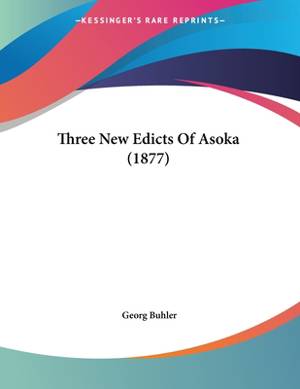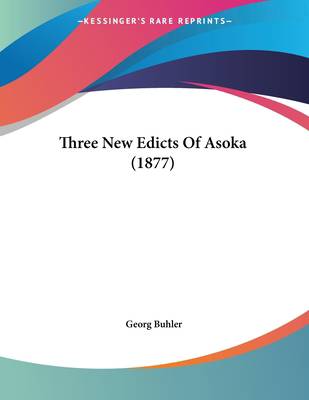
- Afhalen na 1 uur in een winkel met voorraad
- Gratis thuislevering in België vanaf € 30
- Ruim aanbod met 7 miljoen producten
- Afhalen na 1 uur in een winkel met voorraad
- Gratis thuislevering in België vanaf € 30
- Ruim aanbod met 7 miljoen producten
Zoeken
Omschrijving
""Three New Edicts of Asoka"" is a book written by Georg Buhler in 1877. The book is a translation of three newly discovered edicts of the Indian Emperor Asoka, who reigned from 268 to 232 BCE. Asoka is known for his contributions to Buddhism and his efforts to promote peace and non-violence. The newly discovered edicts shed light on some of Asoka's lesser-known policies, such as his efforts to promote the welfare of animals and his encouragement of religious tolerance. The book provides a detailed analysis of the edicts and their historical context, as well as a discussion of their significance for our understanding of Asoka's reign and the history of ancient India. It is a valuable resource for scholars and anyone interested in the history of South Asia and the development of Buddhism.This scarce antiquarian book is a facsimile reprint of the old original and may contain some imperfections such as library marks and notations. Because we believe this work is culturally important, we have made it available as part of our commitment for protecting, preserving, and promoting the world's literature in affordable, high quality, modern editions, that are true to their original work.
Specificaties
Betrokkenen
- Auteur(s):
- Uitgeverij:
Inhoud
- Aantal bladzijden:
- 44
- Taal:
- Engels
Eigenschappen
- Productcode (EAN):
- 9781120942661
- Verschijningsdatum:
- 29/01/2010
- Uitvoering:
- Paperback
- Formaat:
- Trade paperback (VS)
- Afmetingen:
- 216 mm x 279 mm
- Gewicht:
- 167 g

Alleen bij Standaard Boekhandel
+ 67 punten op je klantenkaart van Standaard Boekhandel
Beoordelingen
We publiceren alleen reviews die voldoen aan de voorwaarden voor reviews. Bekijk onze voorwaarden voor reviews.











